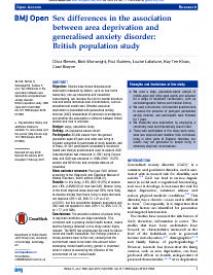Sex differences in the association between area deprivation and generalised anxiety disorder : British population study
Abstract
Objective Studies have shown that area-level deprivation measured by factors, such as non-home ownership, non-car ownership and household overcrowding, can increase the risk for mental disorders over and above individual-level circumstances, such as education and social class. Whether area-level deprivation is associated with generalised anxiety disorder (GAD) independent of personal circumstances, and whether this association is different between British women and men is unknown.
Design Large, population study.
Setting UK population-based cohort.
Participants 30 445 people from the general population aged 40 years and older and living in England consented to participate at study baseline, and of these, 21 921 participants completed a structured health and lifestyle questionnaire used to capture GAD. Area deprivation was measured in 1991 using Census data, and GAD was assessed in 1996–2000. 10 275 women and 8219 men had complete data on all covariates.
Main outcome measure Past-year GAD defined according to the Diagnostic and Statistical Manual of Mental Disorders, fourth edition (DSM-IV).
Results In this study, 2.5% (261/10 275) of women and 1.8% (145/8219) of men had GAD. Women living in the most deprived areas were over 60% more likely to develop anxiety than those living in areas that were not deprived (OR=1.63, 95% CI 1.21 to 2.21; p=0.001), but this association between deprivation and GAD was not apparent in men (OR=1.13, 95% CI 0.72 to 1.77; p=0.598).
Conclusions The absolute numbers of people living in deprived conditions are large worldwide. This, combined with a growing mental health burden, means that the findings obtained in this study remain highly relevant. The WHO has emphasised the need to reduce social and health inequalities. Our findings provide a strong evidence base to this call, showing that the environment needs to be taken into account when developing mental health policy; gender is important when it comes to assessing the influence of the environment on our mental health.
Geachte bezoeker,
De informatie die u nu opvraagt, kan door psychotraumanet niet aan u worden getoond. Dit kan verschillende redenen hebben,
waarvan (bescherming van het) auteursrecht de meeste voorkomende is. Wanneer het mogelijk is om u door te verwijzen naar de bron
van deze informatie, dan ziet u hier onder een link naar die plek.
Als er geen link staat, kunt u contact opnemen met de bibliotheek,
die u verder op weg kan helpen.
Met vriendelijke groet,
Het psychotraumanet-team.
In: BMJ Open, eISSN 2044-6055 | 7 | 5 | May | e013590
http://doi.org/10.1136/bmjopen-2016-013590


